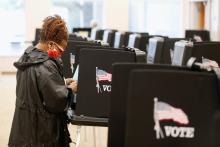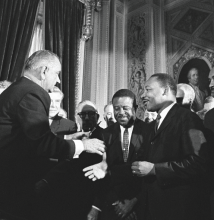preclearance

We believe all human beings are made in the “imago dei,” the image and likeness of God — it’s a core tenet of ours and many other faiths. Just as the COVID-19 pandemic has revealed how injustices in our health care and safety net systems stand in stark contrast to that core ideal, so too does any strategy that would negate a people’s votes because of the color of their skin. It is not just a partisan tactic, but rather a denial of their imago dei, a theological, biblical, and spiritual offense to God. Protecting the right to vote affirms the divine imprint and inherent value of all of God’s children.

BACK IN THE day, when Stevie Wonder was Wishing “those days could come back once more,” my 6-, 7-, and 8-year-old friends and I had no idea what the heck he was talking about, but we loved the groove and would blast Wonder’s Songs in the Key of Life album from our front steps as we played in front of my house in our West Oak Lane neighborhood of Philadelphia.
Sometimes the boys would coast down the street on handmade skateboards, literally made of old skates—the kind with wheels you strapped to your shoes—nailed to short wooden planks. Sometimes the girls and boys would race each other down a steep street, flying at lightning speed on bikes and boards, to see who could make it first to the candy shop at the bottom of the hill. And sometimes, in all the play, a verbal sparring match would break out:
“You so big,” one friend would say, “it take two showerheads to clean yo big butt in the morning!” Then the 7-year-old sparring partner would come back: “Oh, yeah?! You so ugly, yo mama say ‘What dat?’ when she give birth to you!”
It would keep going and we’d all laugh out loud until someone got inappropriate. Usually inappropriateness began with three words: “Yo mama so ...” We all knew to never bring someone’s mother into the sparring match unless you wanted to fight for real. Those were fighting words.
This summer the Supreme Court got inappropriate. They spewed fighting words on the playground that is our national public square.

On Tuesday, the Supreme Court struck down part of the Voting Rights Act that was enacted in 1965 to root out racial discrimination in voting. The specific section of the Act that was stricken — Section 4 — set forth a formula for determining which jurisdictions need federal clearance before making even minor changes to voting procedures. The impact of striking Section 4 is that the most important part of the Act, Section 5, is now rendered useless. Section 5 provides that states, cities, and counties with a history of racial discrimination in voting must “pre-clear” changes to voting procedures with the Department of Justice or a special court in Washington, D.C. Without the formula in Section 4 to determine which states, cities, and counties the preclearance should apply to, the preemptive protection provided by Section 5 no longer exists, and any future challenges to changes in voting procedure must happen after such changes are already in effect.
The majority of the Court felt that racial minorities do not continue to face discriminatory voting practices, and that the preclearance requirement was based on 40-year-old facts that had no logical bearing on present day. Chief Justice Roberts, Jr., wrote:
“Our country has changed. While any racial discrimination in voting is too much, Congress must ensure that the legislation it passes to remedy that problem speaks to current conditions.”
The practical application of Tuesday's decision is that states will be able to enact potentially discriminatory laws that previously had been blocked. This was made immediately apparent in Texas, which announced after the ruling that voter identification laws would go into effect immediately.